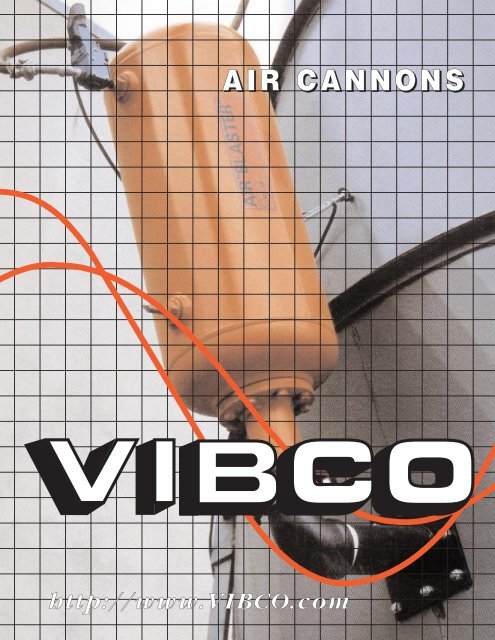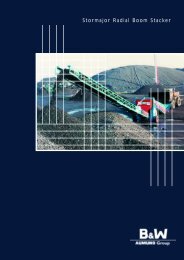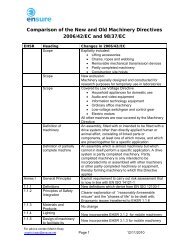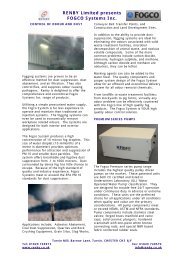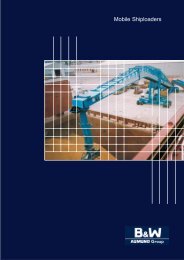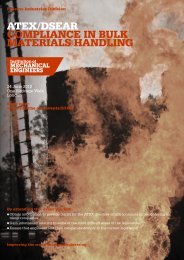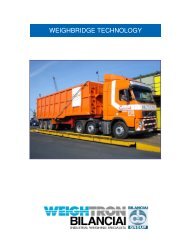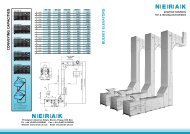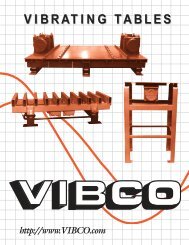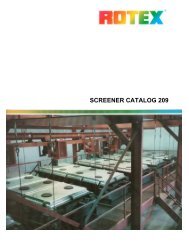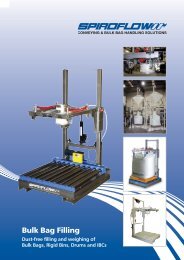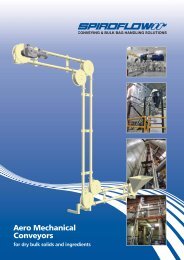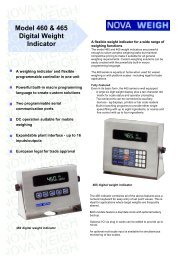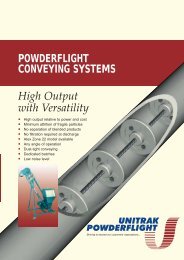You also want an ePaper? Increase the reach of your titles
YUMPU automatically turns print PDFs into web optimized ePapers that Google loves.
A I R C A N N O N S<br />
http://www.VIBCO.com
VIBCO’S <strong>AIR</strong><br />
FILL<br />
BLAST<br />
NEW • REVOLUTIONARY DESIGN<br />
• NO CLOGGING OR STICKING VALVE<br />
• MAINTENANCE FREE • SAFE • NOISELESS<br />
VIBCO'S <strong>AIR</strong> <strong>CANNON</strong> uses a new double piston valve concept to solve material<br />
flow problems.<br />
The VIBCO <strong>AIR</strong> <strong>CANNON</strong> will work safely and efficiently on normal plant air. 80 to<br />
125 PSI is all that is required. No auxiliary compressors needed to provide high pressure,<br />
high volume air.<br />
The VIBCO <strong>AIR</strong> <strong>CANNON</strong> is so simple that it has only one moving part.<br />
The VIBCO <strong>AIR</strong> <strong>CANNON</strong> will work safely and efficiently in any position, on any bin -<br />
thick concrete or light gauge steel - on any material from wood chips, pellets, chemicals,<br />
clay cattle feed, stringy materials and many others.<br />
HISTORY<br />
VIBCO ELIMINATES ”BACKLASH” In the 1970's VIBCO introduced it's "piston" design air cannon which<br />
proved to have many problems; in cold weather the piston froze to the side of the cylinder, in hot weather it swelled<br />
and got stuck. The 0-rings on the piston dried up and caused seepage. The backlash caused material to enter the<br />
blast tube and blocked the piston. (BACKLASH: when the air shot out of the air cannon, it left a vacuum behind it<br />
causing a back suction or "backlash" sucking in material from the bin).<br />
While other competitors remained with this piston design, VIBCO's engineers developed the "Ball Valve" design with a<br />
free flowing ball. This design was a great improvement over the piston design, no more "backlash" because the free<br />
flowing ball, due to gravity, would close off the discharge before a vacuum occurred. No dried up 0-rings, no freezing<br />
or swelling.<br />
However, there was another problem. If the air is contaminated or has an excess of water, the contamination could<br />
wedge between the ball and the wall and seize the ball. To eliminate this last problem, VIBCO came up with the<br />
"DOUBLE PISTON" design, with a free flowing piston like the ball, eliminating the "backlash". No air contamination<br />
can cause a hang up, it is contained in the piston cavity. The piston valve is not in contact with the steel cylinder<br />
and is unaffected by temperature changes. This new patent pending design finally will give you the same user confidence<br />
as VIBCO's other equipment is so well known for.
PATENTED<br />
<strong>CANNON</strong><br />
prevents material sticking to bin walls . . .<br />
HOW IT WORKS<br />
The VIBCO <strong>AIR</strong> <strong>CANNON</strong> or <strong>AIR</strong> BLASTER consists of a high pressure tank storing compressed air<br />
(80-125 PSI) and a quick release piston valve which instantaneously on command releases the compressed air<br />
into the bin or silo.<br />
It is the new and simple double piston design that makes the big difference when compared to other air blasters using a<br />
close tolerance piston with 0-rings as a valve. The pistons in these swell and stick due to atmospheric change. After the<br />
blast the backlash may suck some of the bin material into the valve which also can cause the piston to stick. The 0-rings<br />
due to lack of lubrication, can also stick or dry out, losing their sealing capability.<br />
The VIBCO DOUBLE PISTON has a double piston that fits loosely in the cylinder - no tight tolerance fit. The air<br />
pressure behind the piston forces it against the valve seat where it attains a perfect seal. No 0-rings are needed. It cannot<br />
jam, clog or stick, even if foreign material enters the valve. Picture shows air entering the cylinder through the hose,<br />
passing thru the check valve into the cylinder. The piston is pressed against its seat, forming an air tight seal.<br />
The picture on the right illustrates the "Blast." When the three-way valve (manual or solenoid) is activated, the high pressure<br />
air in the filling line is released to atmosphere. The piston is both sucked away from its seat by the sudden pressure<br />
drop as well as pushed back by the high air pressure in the tank. This allows the high pressure air in the tank to "Blast"<br />
out through the discharge pipe into the material, breaking it loose. When the pressure in the tank has been released, the<br />
piston (due to force of gravity) falls down closing the outlet preventing a "backlash" and bin material from entering the<br />
valve and tank.<br />
FACTS YOU SHOULD KNOW ABOUT<br />
VIBCO'S <strong>AIR</strong> <strong>CANNON</strong><br />
VIBCO's <strong>AIR</strong> <strong>CANNON</strong> creates no flames or<br />
sparks.<br />
VIBCO's <strong>AIR</strong> <strong>CANNON</strong> can be blasted when<br />
needed up to every few seconds.<br />
VIBCO's <strong>AIR</strong> <strong>CANNON</strong> needs no special compressor,<br />
uses regular plant air at 80-125 PSI.<br />
VIBCO's <strong>AIR</strong> <strong>CANNON</strong> tank is certified to<br />
conform to "UNFIRED PRESSURE VESSELS" code.<br />
VIBCO's <strong>AIR</strong> <strong>CANNON</strong> is inexpensive compared<br />
to other dischargers, such as High Pressure<br />
Blast systems, Air Pads, Vibrating Bin Bottoms.<br />
VIBCO'S <strong>AIR</strong> <strong>CANNON</strong> WILL SOLVE<br />
YOUR FLOW PROBLEM<br />
VIBCO's <strong>AIR</strong> <strong>CANNON</strong> mounting is simple.<br />
No structures need reinforcements. The air blast does<br />
not shake the structure, only the material.<br />
VIBCO's <strong>AIR</strong> <strong>CANNON</strong> is economical, takes<br />
but 1/25 of energy used by air pads or other systems.<br />
VIBCO's <strong>AIR</strong> <strong>CANNON</strong> is silent despite its<br />
name - all force and the air bang, like a back-firing<br />
truck, is absorbed by the material in the bin, which<br />
acts as a muffler, and the only sound heard is a mild<br />
"puft". Way below the OSHA requirements.<br />
STICKING TO THE SIDES BRIDGING material RATHOLING or dead ARCHING at end or above<br />
a common flow problem. hanging at lower slope. storage. sloping section.<br />
For additional information about location, ask for installation instructions, Bulletin #8203.
HOW TO SELECT<br />
There are two methods of selecting Air Cannons for your application.<br />
METHOD 1. Select for bin size. As a general rule, if the diameter of the bin~is:<br />
2 to 6 feet diameter or side, use ABS 1-1/2. For materials with densities less than 35 lbs/cu. ft.<br />
6 to 10 feet diameter, use ABS-2. - use 50% more air cannons than indicated above.<br />
10 to 15 feet use ABS 4-2, one for every 13-15 feet If the size of the material discharge opening is so<br />
of circumference or perimeter.<br />
that it holds back the free flow of material Ioosened by<br />
16 to 20 feet use ABS 4-5, one for every 20-25 feet the air cannon, the installation of a small vibrator will be<br />
of circumference or perimeter.<br />
required. By placing a vibrator at the bottleneck “flow<br />
21 to 26 feet use ABS 4-10, one for every 25-30 friction" will be reduced and the desired discharge rate<br />
feet of circumference or perimeter.<br />
can be maintained.<br />
The impact range of the vibrator needs only be 1/4 of<br />
NOTE: If conditions permit, a larger air cannon can be the impact normally used when no air cannons are used<br />
used on a smaller bin than recommended. For example, or one lb. of impact will move 40 lbs. of material<br />
15' bin, two model ABS 4-5 can be used and placed 20- collected in the sloping part of the bin.<br />
25' apart instead of three model ABS 2 placed 13-15'<br />
apart.<br />
METHOD 2. Select for material and area of influence.<br />
This method is used for tough materials and odd<br />
shaped bins. The rules are very simple. First, determine<br />
the area to be blasted (material hang-up area). Second,<br />
according to table, determine material group A or B.<br />
By following the table, the area of blast influence is<br />
determined. Now lay out area of influence in the area<br />
to be blasted. Make the area of influence overlap in<br />
critical areas.<br />
Material Type A: Large chunks, high moisture content;<br />
clings to walls; will set up or harden when stored; weight<br />
in excess of 65-70 lbs. per cu. ft., or slope angles less<br />
than 30° with small discharge openings.<br />
Material Type B: Dry, powdery, stringy or spongy, with<br />
material weight less than 60 lbs. per cu. ft., slope angles<br />
more than 45° and large discharge openings.<br />
ABS-4-10<br />
ABS-4-5<br />
ABS-4-2<br />
ABS-2<br />
ABS-1-1/2<br />
6 FT<br />
5D<br />
ABS-2 2 4 2<br />
4<br />
ABS-4-2<br />
7L 8 FT<br />
ABS-4-5<br />
ABS-4-10<br />
Material A Material B<br />
Model Blast Span Blast Span<br />
No. L 1 x D 1 L 1 x D 1<br />
ABS-1-1/2 3 x 1 4 x 2<br />
ABS -2 4 x 2 7 x 3<br />
ABS-4-2 6 x 4 9 x 5<br />
ABS-4-5 7 x 5 10 x 6<br />
ABS-4-10 8 x 6 12 x 7<br />
TECHNICAL DATA – ALL BLASTERS<br />
Free Air<br />
Model Volume 80 PSI Length Diameter Discharge<br />
No. Cu. Ft Cu. Ft. Inches Inches Size<br />
ABS-1-1/2 .11 .6 24 5-1/2 1-1/2 NPT<br />
ABS-2 .6 3.26 15 10 2 NPT<br />
ABS-4-2 1.36 7.40 24 12 4 NPT<br />
ABS-4-5 4.35 23.67 42 16 4 NPT<br />
ABS-4-10 9.33 50.78 44 24 4 NPT
VIBCO’S <strong>AIR</strong> SWEEPER SYSTEM<br />
WHAT IS AN<br />
<strong>AIR</strong>SWEEP?<br />
The airsweep system consists of a<br />
spring loaded piston valve that<br />
instantaneously upon command,<br />
opens and releases compressed air<br />
in an up to 8’ circle sweeping the<br />
bin side. The air blast reduces the<br />
friction between the bin material<br />
and the bin wall to prevent bridging,<br />
ratholing, packing and clinging of<br />
material to the walls. After firing, the<br />
valve closes and seals off the<br />
discharge opening preventing<br />
material from entering, making it<br />
possible to use the bin for multiple<br />
material charges without<br />
contamination.<br />
The sweeper valve can operate in temperatures up to 9000° and be supplied in carbon or stainless steel. Two systems<br />
are available:<br />
SYSTEM I<br />
The Sweeper Valve is added to ABS-2, and ABS-1-1/2 blasters to deflect the blast along the side of the bin to break the<br />
bond and friction between the material and bin wall. The Sweeper Valve is especially suitable when material bridges<br />
close to the discharge due to flow obstructions, such as rotary valves, chutes, or feed pipes, or discharge openings.<br />
SYSTEM 2<br />
Consists of strategically located air sweep valves, solenoids, air receiver tank and timer. The timer is programmed to<br />
pulse blast small amounts of high velocity air along the bin wall reaching up to 8' diameter, dislodging, aerating, and<br />
moving the material towards the discharge opening. This system produces more positive results than air pads without<br />
clogging and with a higher air velocity and better aeration that also sweeps the side of the bin removing material sticking<br />
to the bin side, allowing multiple materials charges without contamination. Two sizes available, ASP-75-3/4 NPT and<br />
ASP-150-1-1/2 NPT. Ideal to use on smaller bins made of fiberglass, wood, down- spouts, pipe and chutes, etc.<br />
ASP-150<br />
<strong>AIR</strong>SWEEP<br />
Sequence<br />
Timer<br />
Control Box<br />
115V<br />
Supply<br />
Plant<br />
Air<br />
Supply<br />
Filter<br />
Receiver<br />
Solenoid<br />
TECHNICAL DATA – SWEEPER VALVE<br />
Discharge Air Sweep- Air<br />
Model Size Pressure Span Usage<br />
No. NPT PSI Feet CF*<br />
ASP-75 3/4<br />
40 2 .3<br />
60 3 .5<br />
ASP-150 1-1/2<br />
80 6 1.8<br />
90 8 2.4<br />
*For System 2. For System 1 see Air Cannon Volume Cu. Ft.
HOW TO INSTALL<br />
AVAILABLE ACCESSORIES<br />
MOUNTING ACCESSORIES<br />
STEEL BIN<br />
WOODEN BIN<br />
CONCRETE BIN<br />
SWEEPER VALVE<br />
All Air Cannons come complete with 3-way,<br />
110/120 volt, 50/60 Hz Solenoid Valve and<br />
Quick Exhaust Valve. ABS-2 and ABS-4 Air<br />
Cannons also come with Safety Relief<br />
Valves.<br />
1. Safety Cable<br />
2. Mounting Kit, consisting of:<br />
A.) Set of Companion Flanges<br />
w/Bolts<br />
B.) 90° Street Elbow<br />
C.) Mounting Flange (Note: Mounting<br />
flange comes standard with “L”<br />
dimension of 2-1/2”. Please<br />
specify with order if longer<br />
dimensions required.)<br />
3. Directional Elbow (45° or 90°)<br />
4. Diffuser<br />
5. Sweeper Valve (ABS-1-1/2 & ABS-2)<br />
6. Back-up plate for wooden bin<br />
CONTROLS<br />
The complete installation is done easily and quickly.<br />
Once the trouble area is determined, a hole is cut in<br />
the structure one inch larger than the release pipe of<br />
the air cannon. The mounting flange is then welded<br />
or bolted to the bin side over the hole. The cylinder is<br />
attached to the release pipe and the air and operating<br />
connections are made. The operation can either<br />
be made manually or automatically. The manual<br />
incorporates either a simple air release valve or a<br />
solenoid with an electric switch. The automatic operation<br />
consists of a solenoid valve and timer. Once<br />
installed, the cycle time can be changed from once a<br />
day or when necessary, to be as fast as the cylinder<br />
can be filled with air. Ask for special bulletin #8203.<br />
SYSTEM 1 SYSTEM 2 SYSTEM 3<br />
OR<br />
OR<br />
VIBCO'S DOUBLE PISTON VALVE AVAILABLE FOR<br />
MOST <strong>AIR</strong> <strong>CANNON</strong>S<br />
Vibco's maintenance free double piston valve fits most competitors' air cannons. They are easily retrofitted into<br />
Style 1 and Style 2. For other styles contact our Engineering Department.<br />
HOW TO ORDER: Either give original manufacturer's model or just Style 1 or Style 2. Give the diameter D and length L.<br />
L<br />
D<br />
D<br />
STYLE 1 STYLE 2<br />
L
VIBCO’S <strong>AIR</strong> <strong>CANNON</strong>S<br />
ON THE JOB<br />
TWO ABS-4-5 <strong>AIR</strong> <strong>CANNON</strong>S ON FEED BIN:<br />
Company used cannons to maintain a continuous<br />
feed of bark and wood chips to fire boiler No bridging or<br />
packing over screw conveyors occurred.<br />
ABS-4-5 <strong>AIR</strong> <strong>CANNON</strong> ON CEMENT SILO:<br />
Long pipe was used to eliminate aerated cement from<br />
backing up in discharge pipe.<br />
<strong>AIR</strong> <strong>CANNON</strong> & <strong>AIR</strong> VIBRATOR COMBO:<br />
Air Cannon moves material to feed chute where VS-320 air<br />
turbine keeps material moving.<br />
ABS-4-2 ON WHEAT GLUTEN BIN: Material would<br />
cake up making discharge impossible Continuous<br />
aeration eliminated this problem<br />
HOGGED FUEL BIN HAS 4 ABS-4-5: Lumber<br />
company installed air cannons to move the hogged fuel<br />
to the internal agitators reducing boiler down time.<br />
ABS-2 ON CEMENT HOPPER: Continuous blasting<br />
kept cement aerated and free flowing.
VIBCO’S <strong>AIR</strong> <strong>CANNON</strong>S<br />
ON THE JOB<br />
HIGH TEMPERATURE BIN: Recycling bin with 300°F temperature<br />
use ABS-4-10’s. Long discharge pipes eliminate heat problem.<br />
Ask for Bulletin 9060.<br />
CO-GENERATION PLANT: Use ABS-4-5<br />
blasters to feed cut-up paper bags to furnace.<br />
Ask for Bulletin 9065.<br />
ABS-2 KEEPS WOOD CHIPS FLOWING: Air cannon was<br />
placed just above stacker chute to keep it clean and wood chips flowing.<br />
Ask for Bulletin 9124.<br />
ABS-4-10’s ON ZINC BUNKER: Ground zinc dust collected in<br />
bunker and fed into factory for processing. Ask for Bulletin 9070.<br />
We're The Vibrator Guys. ®<br />
CONTACT OUR ENGINEERING DEPARTMENT FOR RECOMMENDATIONS.<br />
VIBCO, INC.<br />
75 Stilson Road, P.O. Box 8<br />
Wyoming, RI 02898<br />
E-Mail: vibrators@vibco.com<br />
Phone: (401) 539-2392 / (800) 633-0032<br />
FAX: (401) 539-2584<br />
http://www.VIBCO.com<br />
West Coast:<br />
Phoenix, Arizona 85254<br />
Phone: (480) 596-1809<br />
(800) 633-0032<br />
FAX: (480) 596-1614<br />
Canada:<br />
2215 Dunwin Drive<br />
Mississauga, Ont.L5L 1X1<br />
Phone: (905) 828-4191<br />
(800) 465-9709<br />
FAX: (905) 828-5015<br />
SEE US AT www.VIBCO.com<br />
#9131B<br />
©2001 VIBCO, INC.


